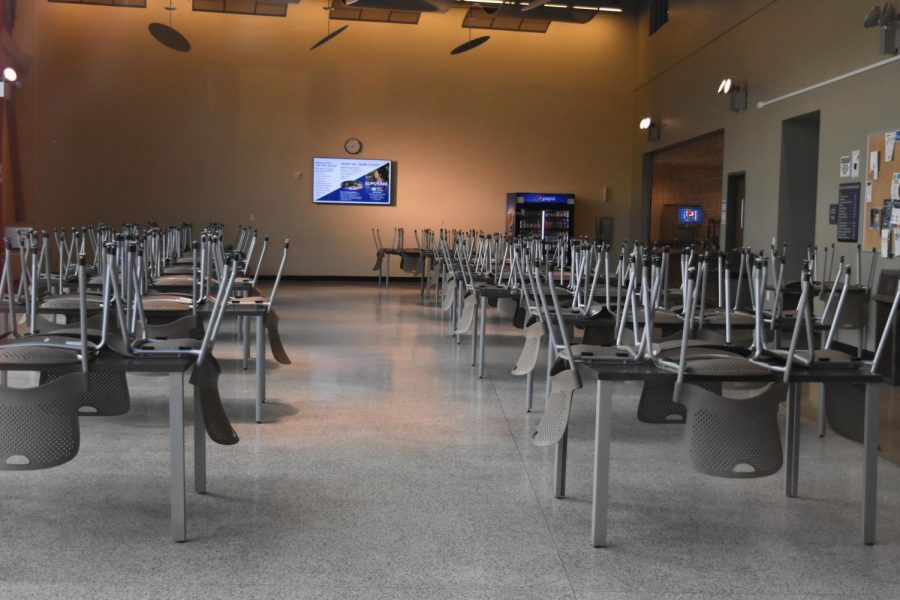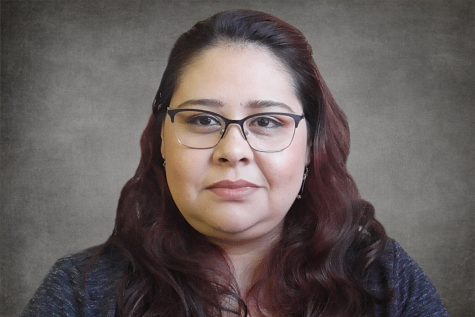Campus closures create ripple effect amid coronavirus concerns
The Student Dining Hall remains empty as Contra Costa Community College District campuses are closed due to Coronavirus concerns.
Mar 31, 2020
As the numbers of COVID-19 cases increase every day nationwide, the Contra Costa Community College District enters its third week of campus closures and remote instruction today at its three colleges.
Interim Chancellor Gene Huff said the official order from the county is to shelter-in-place until April 7, and the district is waiting for additional word from Contra Costa County Health Services for guidance.
“We know that the K-12 schools in six counties in the Bay Area (including Contra Costa County) announced they would remain closed until May 1,” Huff said. “So even if we were thinking about staying open because the county health services say it is OK, the fact that all K-12 schools are closed will put pressure on our employees. That’s definitely a factor we are considering (to extend the campus closure date) right now.”
Huff said the district is expecting to receive updated information from Contra Costa County on April 7. In the meantime, the district is going to follow its original plan of staying remote until at least April 30.
“Our thinking is that sometime before next week, the county will give updated guidance and we are going to follow whatever (they) say,” he said. “Once we have a definite answer, we will send a group message out to faculty, staff and students, and will also share it in social media.”
Also, on March 19, Gov. Gavin Newsom ordered a statewide shelter-in-place for an indefinite amount of time, allowing only “essential” services, like gas stations, grocery stores and banks, to remain open.
Near the beginning of the coronavirus pandemic, in a districtwide email sent March 10, Huff announced the implementation of remote instruction for lecture-based classes and the cancelation of all public events on district campuses and in the District Office in Martinez.
Huff’s email stated, “The district is taking all appropriate measures and will continue to follow the expert guidance of the California Department of Public Health and Contra Costa Health Services. The California Department of Public Health has provided clear guidance for when institutions should consider temporary closure. Consistent with this guidance, our campuses will remain open.”
But on March 15, students were notified of the closure of all three campuses via an Emergency Alert email.
That Emergency Alert email stated, “In response to the emergency declarations from the state of California and Contra Costa County, the Contra Costa Community College District and its colleges – Contra Costa College, Diablo Valley College-Pleasant Hill and San Ramon Campus, and Los Medanos College Pittsburg Campus and Brentwood Center – have suspended all face-to-face classes and face-to-face student interactions beginning Monday, March 16, 2020. All campus locations will be closed to students to minimize the spread of the coronavirus until further notice.”
That order effectively moved all district lab classes to remote instruction as well.
On March 16, the district announced in a press release that it had paused the hiring process for a new district chancellor due to coronavirus concerns.
Interim Chancellor Huff said, “We decided to delay the chancellor (hiring process) for a month. It will be a challenge to start recruitment if you can’t talk to candidates or meet with them face-to-face. On April 9, we will gather to make further decisions about whether they are going to continue the search, postpone the search or cancel the search.”
Huff said since Gov. Newsom’s statewide coronavirus shelter-in-place order on March 19, all in-progress full-time hires are on hold.
“A lot of businesses are shut down, and we definitely anticipate (the pandemic and subsequent shelter-in-place orders) will have a financial impact on our district,” he said. “We are looking at all of our expenditures, and we will be very thoughtful about hiring moving forward.”
Essentials still show
CCC, like its sister colleges LMC and DVC, remains closed to the public.
Buildings and Grounds Manager Bruce King said only staff members deemed essential are allowed onto the campus.
“There are a few folks who are required to be on campus to do their work,” King said. “Most instructors are able to do their office work from home, but there are a few who do their remote instruction from CCC. Police Services are on campus to provide security, and Buildings and Grounds has some staff members who come to the campus to take care of repairs and maintenance.”
King said the custodial department has a rotation of custodians who are going to each building to make sure bathrooms are clean, and they also check for water leaks.
Custodian Adriane Sims said they are using the 710 multi-purpose disinfectant to clean every room on campus.
“We make sure to wipe all desks, doorknobs, railings, door handles, bathrooms, push doors and light switches,” Sims said detailing the cleaning the custodial staff has undertaken on campus.
King said the current construction projects on campus have not been affected by the campus closure because construction is one of the “essential” jobs allowed to continue by Gov. Newsom.
“Our two construction projects are going full blast,” he said. “The Science Building project is probably a little ahead of schedule, but the Gymnasium project is still behind schedule.
“We are able to keep the construction projects going, but just like a lot of things in the country and California, they can’t get some things as quickly as they used to,” King said. “They are not able to go as fast as they would like, but the crew is doing the work they’re supposed to be doing.”
Student stress rises
Students are most affected by the changes in instruction and campus closures. While some students struggle to adjust to remote classes, others struggle with the uncertainty that the closures might affect their transfer requirements for a four-year college or university next fall.
Huff said the district has been thoughtful about making sure the change to remote instruction would not affect the requirements for transfer.
“The fact that we moved the courses online has really given us the best assurance that classes will still be transfer eligible,” he said. “But there are a few classes, particularly in some of the Career/Technical Education and science areas, where there are requirements for hands-on interactions. So we are not 100 percent sure how all that is going to work out.”
“My counterparts at the CSUs and UCs in the Bay Area have given their assurance that, given the circumstances, they are taking into consideration that everybody is working remotely and an articulation agreement for rules for transfer was put in place,” he said.
“Cal State-East Bay said their intent is to take into consideration that all the classes and specific lab requirements are being taken online.”
Since all the public events were officially canceled or postponed until April 30, the future of the commencement ceremonies at CCC, DVC and LMC is uncertain.
Huff said there seems to be a misconception among students that the graduation ceremony is a factor as to whether or not a student gets a certificate or degree. However, degrees are awarded whether there is a graduation ceremony or not, as long as graduation requirements are met.
“The graduation ceremony is two months away, so we are reluctant to cancel it yet,” Huff said. “But we are definitely not going to hold it face-to-face (in May) given the circumstances,” he said. “We are looking for other options, from a virtual ceremony to a summer or fall graduation (ceremony). All of those options are on the table.”
While students and instructors continue to adjust to remote education, CCC has various resources to help them with the sudden transition.
Dean of Students Dennis Franco said the state’s distance education resources and the Online Education Initiative (OEI) are assisting college faculty throughout the state, including those at CCC. The OEI is providing virtual appointments with success coaches to support students and faculty.
Also, the CCC Foundation is purchasing additional Chromebooks to assist students who find themselves without access to a computer or the internet, Franco said.
“We have done two separate Chromebook loaner events and are exploring the possibility of adding more, and possibly mailing Chromebooks to students.”



